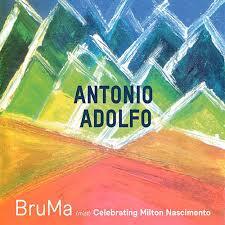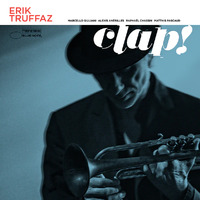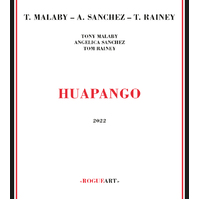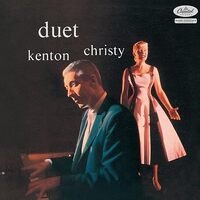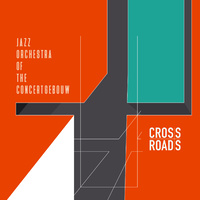Release date 2020
Two young musicians in Rio De Janeiro became friends and, briefly, collaborators back in 1967.
Antonio Adolfo, a 20-year-old pianist and Rio native, was leading a pioneering samba-jazz group called The 3-D Trio. Milton Nascimento, a largely unknown 25-year-old guitarist and singer who hailed from the small city of Tres Pontas in mountainous Minas Gerais, was in town to perform at the International Song Festival.
Since then, Adolfo has gone on to be one of the foremost bandleaders in Brazilian jazz, and Nascimento, of course, became one of Brazil’s most essential and influential singers. But in 1967, they both were trying to make a name for themselves.
“Milton is a genius,” Adolfo recently declared over the phone from Rio while discussing his latest release, BruMa (Mist): Celebrating Milton Nascimento.
The pianist fondly remembers hanging out at the home of songwriter brothers Marcos and Paulo Sérgio Valle with the soon-to-be star and others who became major figures in Brazilian pop, a group that included Roberto Menescal, Toninho Horta and Arthur Verocai.
“Marcos wrote a song called ‘Viola Enluarada’ that we recorded together—Marcos and Milton, backed by my 3-D Trio, with strings arranged by Dori Caymmi. The song became a hit,” Adolfo said. “Then we did a show at the Teatro Santa Rosa for two months that featured some of Milton’s songs like—‘Outubro,’ ‘Vera Cruz,’ ‘Travessia’ and ‘Tres Pontas.’ That was the only time I performed with Milton.”
Nascimento went on to claim 2nd prize in the song festival, launching his career in Brazil, and “Travessia”—with an English lyric by Gene Lees—eventually went on to become his first international hit.
Adolfo features “Outubro” and “Tres Pontas” on BruMa, as well as seven other Nascimento compositions, including “Nada Será Como Antes,” “Canção Do Sal” and “Cais.”
“I always thought about recording his songs,” Adolfo said. “It’s the combination of Milton’s voice, his arrangements, his playing, and his harmonic and rhythmic concepts. In the ’60s and ’70s, he brought some odd meters and modal ideas that he got from Miles [Davis] and Herbie [Hancock] and Wayne [Shorter]. Besides the modal thing, he did new types of [chordal] voicings on his guitar. It was all very modern, very original; nobody writes like him. That’s why jazz musicians like Wayne and Herbie love him: He is so jazzy.”
Although he reveres the highly sophisticated harmonies in Nascimento’s originals—“They say the music that comes from Minas is very rich in harmony because of the mountains,” Adolfo said—he didn’t hesitate to adapt them to his own jazzier intentions. “Other artists performing his songs don’t want to touch his harmonies; but I did, somewhat,” he continued.
Adolfo’s harmonic liberties with Milton’s songs are evident in the dense note clusters of his horn chorales for trumpet/flugelhorn, alto, tenor and trombone, for instance, on the ballads “Cais” and “Encontros E Despedidas.” He also alters the songs’ rhythmic forms, recasting the famous “Nada Será Como Antes” as a jazz shuffle and “Fe Cega, Faca Amolada” in the quadrilha style (a fast-paced version of a Brazilian square dance).
Adolfo has become something of a Brazilian jazz icon himself. As a young pianist and arranger, he studied with Eumir Deodato and Nadia Boulanger, and he’s written hits like “Sa Marina” (or “Pretty World,” with English lyrics by Alan and Marilyn Bergman), which has been covered by Stevie Wonder and Sergio Mendes. Calling on a regular group of about eight of the finest jazz players in Brazil, Adolfo’s recorded prolifically in recent years, collecting seven Grammy and Latin Grammy nominations since 2014. A noted educator, he runs his own school of Brazilian music since 1985, with three branches in Rio, and 1,300 students. He’s also published a dozen books and videos on Brazilian harmony and rhythm in both English and Portuguese.
BruMa almost didn’t happen because of the pandemic. “We started recording on March 15, as it turned out, the very last date we could do it,” he said. “The following week they closed all the studios. I wasn’t afraid; the studio was spacious. The separation of the instruments gave us confidence that it would be safe. Everyone is still healthy, thank God.”
Adolfo was never the cautious type, though. He was a pioneer of independent recording in Brazil, heading up his own label since the 1970s. “It’s the only way I can do it now. I like to do whatever comes to my mind … even if it doesn’t sell. I’ve done about 10 albums myself, plus two albums [by my daughter, singer Carol Saboya], and two duo albums with Carol. They are doing well.”
Then there is occasional serendipity.
Last year, Adolfo was pleasantly surprised by an immaculately produced new cover of “Pretty World” by Sheléa, a Quincy Jones protégé, that featured Stevie Wonder on harmonica. Then there was his 1977 song, “Aonde Voce Vai,” the only song Adolfo sang on his indie debut, Feito Em Casa.
It was “a very simple song,” he said. “And, strangely enough, it was somehow discovered recently and used in the HBO series High Maintenance. And now it’s doing very well on Spotify.”
From DownBeat
(195079312618)
| SKU | 195079312618 |
| Barcode # | 195079312618 |
| Brand | AAM Music |
Be The First To Review This Product!
Help other Birdland Records users shop smarter by writing reviews for products you have purchased.

